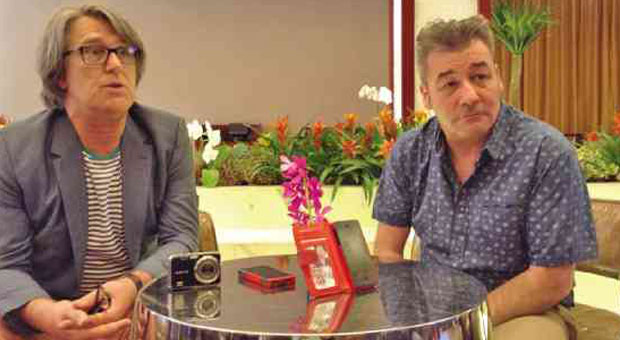China Crisis on Friday night at the Solaire Resort & Casino

GARY Daly (left) and Eddie Lundon don’t think they’ll ever get to perform in China. photo by emmie g. velarde
More than wishful thinking, a good touring track record and active promotion propelled the 2002 Manila concert of the English pop/rock band China Crisis, 1980s hitmakers (five Top 40 singles and three Top 40 albums in the United Kingdom).
Living up to the expectations of their Filipino fans brought founders/front liners Gary Daly and Eddie Lundon back to the country two more times.
On Friday night, on their fourth visit, CC takes the Solaire Resort & Casino Grand Ballroom stage.
The show starts at 8 p.m. with four local concert artists collectively known as Mark Mabasa & Friends.
The Inquirer sat down with Daly and Lundon on Wednesday at a press conference, which they jump-started with back-to-back performances of their biggest hit, “Wishful Thinking,” and their critically-acclaimed tribute to Ray Charles, “Black Man Ray.”
Article continues after this advertisementYou have never tried to defend your choice of a name, China Crisis.
Article continues after this advertisementLundon: No, but we can tell you why we picked that. When the band was formed in 1979 (in Kirkby, near Liverpool Merseyside) there was so much mystique and mystery about the East, partly political. And the world wasn’t getting much information from the country at the center of it, China.
In the light of current events, have you ever thought of changing your name?
Lundon: Not really, though it’s a pity we may never get to perform in China.
You have been on the concert road for years. Next to the Filipinos, who are your best audiences?
Lundon: The audiences in Toronto, London, Spain, Germany…
You’ve been successful in Australia as well.
Lundon: Yes, though we’ve never been there.
How do you keep your music fresh?
Daly: We have new original songs—all-original material— in a new album, “Autumn in the Neighbourhood,” which we are releasing this year. One of the songs, “Everyone You Know,” is available as a free download on the Pledge Music website.
(Another track, “Being in Love” was premiered on BBC Radio in April.)
Lundon: Getting to play with local musicians when touring is another way. We get some incredible input. We enjoy working with our Filipino musical director Carlo (Gaa).
How has it changed?
Daly: Technology has changed and, with it, necessarily, the way music is recorded. But for us, the music itself—melodies, how they are created—cannot change. Many people are still partial to music they can sing along to. Filipinos certainly are.
How do you feel about electronic music then?
Lundon: Even that has a place in the new landscape. Music makers differ only in the way they use it to their advantage.
There seems to be a resurgence of interest in the 1980s, music-wise.
Lundon: Which makes us happy. That certainly was a very good time, before dance music and hip-hop.